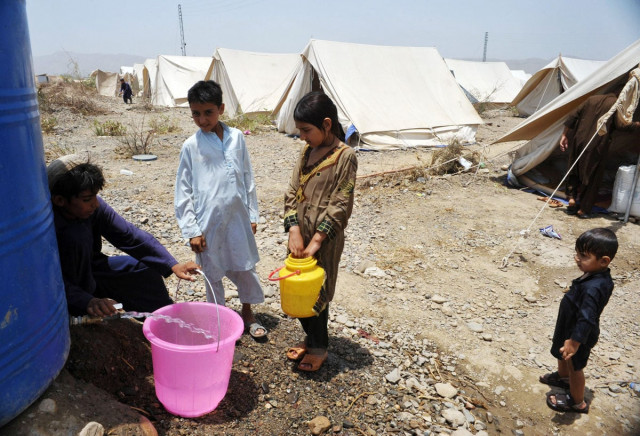Powerful tides
North Waziristan IDP crisis is going to get worse before it gets better — one of the few certainties before us today.

No timeline has been set on the operation in terms of how long it may last and experience has shown that IDPs are slower to return than they are to leave. The men, women and children who have flooded into Bannu district may be there for months — or longer.
The government had made some provision prior to the operation beginning and there is a large and well-stocked tented camp specifically for IDPs about 15 kilometres from Bannu — but it is almost empty. A private television channel reported on June 26 that the tents had electrical connections, ration distribution points and there were a mobile hospital and a dispensary — but a mere 340 had chosen to live at the Bakkakhel camp. ‘Cultural’ reasons were cited as in people would prefer to live with their relatives or friends, but it could well be a matter of security. Thus, the vast majority of those who have been uprooted are fending for themselves and it is a recipe for trouble in the short and medium term.
Prime Minister Nawaz Sharif visited the area on June 27. He promised to increase government spending on those displaced by the operation and acknowledged that the people of North Waziristan were “sacrificing their today for a better future and the curse of terrorism will be rooted out from this country because of their sacrifices”. It will not. And the prime minister is deluding himself and the nation by saying so. The roots of militancy today have their origins in the country’s past, especially the era of General Zia when the same areas were used to send “Mujahideen” into Afghanistan to fight the communist Soviet Union. Hence, they will not be attenuated solely by an operation that was telegraphed sufficiently in advance for those that the army had come to fight to make their way out of North Waziristan with all haste.
The prime minister said that Rs40,000 will be given to each family to sustain them through the holy month of Ramazan and this is indeed welcome news — but it is not sustainable for long and a government that is battling a national economic crisis on a variety of fronts does not have deep pockets. There will be a modicum of international aid and the World Food Programme is already busy working with the IDPs; there were more promises in the form of new schools, hospitals and water and sanitation projects — but that is on a rainbow-bedecked horizon far away.
Today, the IDP population is angry but not sufficiently organised to be restive. They have, in the most literal sense, lost everything. Their homes and livelihoods and their traditionally conservative way of life is under threat. They bring with them unvaccinated children to add to the deadly and expanding pool that the polio virus thrives in, and within that vast multitude, there may be some who are sympathisers of the extremists in whose pursuit they have been ousted as they lived cheek-by-jowl with them for many years. Those sympathies are not going to die overnight. The North Waziristan IDP crisis is going to get worse before it gets better — which is one of the few certainties before us today.
Published in The Express Tribune, June 29th, 2014.
Like Opinion & Editorial on Facebook, follow @ETOpEd on Twitter to receive all updates on all our daily pieces.














COMMENTS
Comments are moderated and generally will be posted if they are on-topic and not abusive.
For more information, please see our Comments FAQ